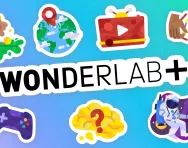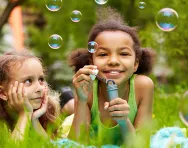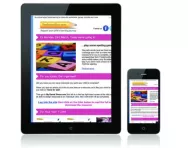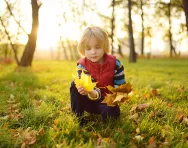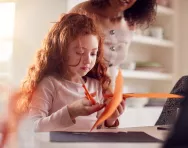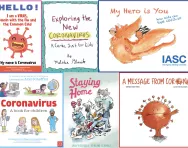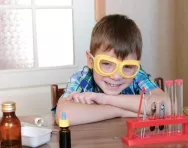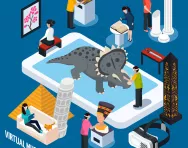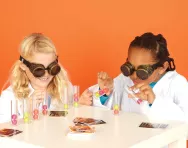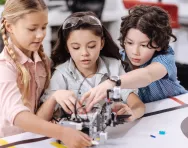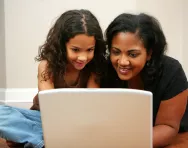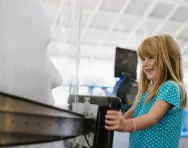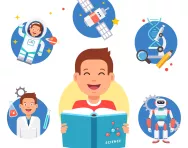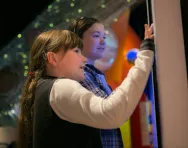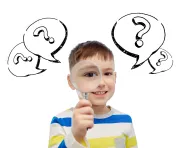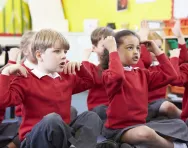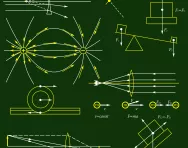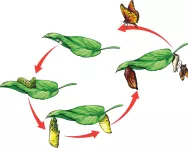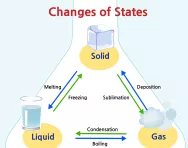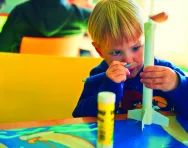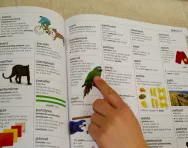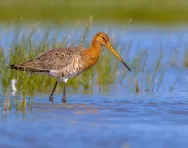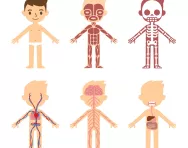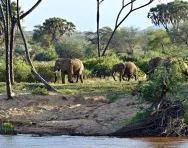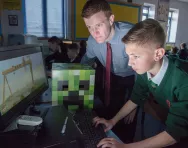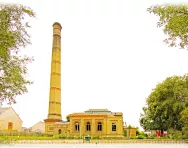6 interactive games to ignite scientific curiosity at home
Looking for ways to nurture your child's natural curiosity in science? Hands-on activities and experiments at home offer an exciting way for children to explore the wonders of the world around them.
Pawsitive changes: Animals transforming schools
Primary school headteacher, Matt Revill, explores the transformative impact of animals in educational settings, addressing key questions such as how dogs assist children in reading, the inspirational value of farm visits and the benefits children derive from therapy pets.
24 fun toys for summer outdoor learning
It's well established that outdoor play is important for young learners and provides opportunities to develop physical, social, fine and gross motor skills. Our editor, Kate Morgan, has put together her top picks of outdoor toys. So get the kids outside, having fun and learning this summer. Let the games begin!
How the daily learning programme works
Whether you're taking your child out of school for a period, setting out on your home education journey or simply looking for extra activities to boost your child's learning, here's why the daily learning programme could be the right fit for you...
Forest school fun for kids
Learn to read clouds and enjoy some splashy water games in the great outdoors with an extract from Forest School Wild Play by Jane Worroll and Peter Houghton.
No-budget STEM fun at home
At-home science doesn't have to involve expensive special equipment! Primary school teacher and author of the 15-Minute STEM series, Emily Hunt, suggests some brilliant STEM uses for everyday items you'll find in your recycling bin, along with three quick, creative STEM activities your family can try with each of them. Will you make a water xylophone, a ping pong ball run or a hurricane house?
Best wildlife and nature home education resources
Watch wildlife webcams, construct habitats, grow seeds on a windowsill and make eco-friendly choices – we've rounded up the best nature and wildlife home education resources to help your child explore the world without straying from home.
Best science home education resources
You don't need a Bunsen burner, a chemistry set or a science degree to share these STEM (Science, Technology, Engineering and Maths) activities with your child at home. Whether you want to try a hands-on experiment, ask an expert some questions via video chat or play some interactive games, you'll find lots of science home education options in this round-up of resources.
Best kids' activity packs to download
Top up the resource bank and keep the kids busy at home with reading, puzzles, crafting, science and other screen-free activities. They're all available to download for free and you won't need any special equipment, so head off the "I'm bored!" moans and buy yourself a few moments of peace so you can get some of your own work done!
Best children's books about coronavirus
Even adults are finding it hard to get their heads around the new "normal" – so how can you help your child understand how and why the coronavirus pandemic has up-ended our lives? Whether you're reading to a preschooler or want your tween to have scientifically-accurate facts, these free, downloadable eBooks will help you explain COVID-19 to kids.
Best YouTube channels for home education
Whether you want your child to learn about maths, geography, science or history, they'll be happy to watch a video about it – and these YouTube channels introduce topics through songs, animations, experiments, skits and riddles. From phonics for new readers to physics for keen scientists, these are the educational channels to subscribe to.
Hands-on science fun
Transform one substance into another and watch colours and textures change right in front of your eyes with our at-home, hands-on science activity suggestions from Dr Michelle Dickinson, prize-winning nanotechnologist, researcher and founder of Nanogirl's Lab.
50 of the best virtual trips and educational experiences for families
In this day and age, we may be spending more time indoors but thanks to our laptops and devices we can let the world come to us instead – take a trip round Frida Kahlo’s kitchen, share some chocolate cake with Michael Rosen and journey to the International Space Station with our pick of 50 of the best virtual trips and educational experiences. By Hetty Walton
20 of the best live streams for kids
Help your primary-age child stay educated and entertained with our round-up of the best live streams for kids.
Best science board games for children
Have fun with chemistry, physics and biology with these family science games, designed to make STEM learning interactive and competitive, and introduce concepts like quantum physics, space exploration, evolution and ecology to KS1 and KS2 learners (and parent players, too!).
Best activity books for children
Whether you're on the move or at home, a great activity book offers hours of screen-free learning and fun. Crosswords, maths challenges, mystery solving and code writing are all covered in our best activity books for kids picks. We can't guarantee you won't want to help out with the puzzling, though!
Museums reviewed by parents: Glasgow Science Centre
Find out about forces, get confused by optical illusions, blow up a balloon (literally!) and have fun discovering the world around you at the Glasgow Science Centre – and bring the whole family!
How to future-proof your child's learning
Is your primary-school child getting the education they'll need to thrive in the 21st century? Jill Hodges, CEO and Founder of Fire Tech technology classes and camps for kids, describes the five skills young people will need, at work and in life, to make the most of our technological society's opportunities.
Museums reviewed by parents: Centre of the Cell London
If you love London’s fabulous Science Museum but feel your family has done it inside and out, Centre of the Cell, a cutting-edge tech centre in East London, is perfect for expanding your horizons. There’s hands-on fun to bring out the budding doctors, nurses, lab technicians and pathologists in all ages!
How to help your child develop research skills
Knowing how to use books and the internet for research is a vital skill for KS2 pupils. We explain how to help your primary-school child.
Museums reviewed by parents: Winchester Science Centre
Hands-on science at its best, Winchester Science Centre and Planetarium offers an experiment-packed day out for the whole family. We review what's on offer for pint-sized scientists and their accompanying grown-ups.
Museums reviewed by parents: Science Museum London
Contemplate the awe-inspiring complexity of life and human scientific achievement at London's Science Museum, one of the world's leading attractions. There's something for the whole family to enjoy, from toddlers to teens, and the addition of the new Wonderlab permanent gallery for kids makes it a must-visit destination. On your marks, get set... wonder!
Museums reviewed by parents: Howletts Wild Animal Park
Watch lemurs leaping over your head, come face-to-face with a family of gorillas or even have a quick clamber through the treetops – there's a world full of animal magic to discover at Howletts Wildlife Park in Kent for parents and primary-school children alike.
Best science fiction books for children
It's science fiction, but not as we know it... Introduce your child to quantum physics, open their eyes to the vastness of the universe, help them experiment with the elements of the periodic table and give them the confidence to explore their own scientific ideas with our pick of the best kids' fiction about science and our world.
Best science books for children
Bring science concepts from evolution to magnetism and atomic energy to life for primary-school children with our pick of the best non-fiction science titles for kids. Fact-packed and fun-packed, these books will engage and entertain kids (and parents!) as well as explaining the building blocks of physics, chemistry, biology and engineering.
Museums reviewed by parents: National Space Centre
The National Space Centre is a day out that the whole family will enjoy; it’s a fun, interactive and accessible way to learn about the universe we live in. Just don’t be surprised if you leave with a budding astronaut or two!
6 ways to make science fun for kids
Science may be one of the most hands-on subjects at school, but making it accessible isn’t always easy. We asked the experts how to channel your child's natural curiosity into a life-long interest in the world around us and how it works.
Best learning songs
Could songs and music help your child learn and remember English, maths and science facts? We pick our favourite learning songs, covering everything from adverbs and angles to onomatopoeia and photosynthesis.
What is a force?
Without forces our world would be silent and immobile. We explain what children learn about forces in Year 3 and Year 5 in the primary-school classroom, and how you can support their learning with hands-on activities and experiments at home.
What is a life cycle?
All living things have life cycles; animals produce offspring and plants produce seeds which germinate into new plants. Find out what your child learns about life cycles in the primary-school classroom, plus easy ways to support their learning at home.
What are states of matter?
Matter makes up our physical universe. In primary school children learn about the matter on Earth, which exists in one of three main states: solid, liquid or gas. We explain what your child is taught about states of matter in KS2 science.
Butlin’s Astonishing Family Science Weekend reviewed by parents
Butlin’s new Astonishing Family Science Weekends are designed to give children aged six to 14 a taste of how science works in everyday life. Lucy Dimbylow visited the Bognor Regis resort with her children Tom, 10, and Katie, 5.
Best reference books for children
Reference books and dictionaries offer us information that's accurate, well researched and beautifully presented and are invaluable when you're working on a homework project. From atlases to dictionaries and encyclopedias, we recommend some of the best English, maths, science, history and geography reference books for primary-school children.
Learning about plants in primary school
From the parts of a plant to the seed cycle, water transportation and photosynthesis, children learn lots about the living things around us in primary school. Find out what is taught when in the primary classroom in our parents' guide.
Learning about animals in primary school
Carnivores, herbivores and omnivores; vertebrates and invertebrates. Your child will learn about animals and their classification in primary school. We explain what they will find out about amphibians, birds, fish, mammals and reptiles.
Learning about the body in primary school
At primary school children learn about the senses, the human skeleton, teeth and their function, the digestive system, puberty, the circulatory system and more. Find out what they'll be discussing in the classroom when and how you can support their learning at home.
What is a habitat?
Children are introduced to all kinds of habitats in primary school, from arid deserts to lush rainforests and vast oceans. Find out what your child will learn in primary-school science and how you can support your child's learning at home.
The best science days out for families
Looking for a great day out that's educational, too? Inspire your budding scientist with a trip to one of these brilliant, hands-on UK science centres.
Learning through Minecraft
You may think it’s just another video game – albeit a particularly addictive one – but Minecraft could have educational benefits too…
Museums reviewed by parents: Cambridge Museum of Technology
The Cambridge Museum of Technology is a fascinating, hands-on look at how things work for all ages, within easy distance of the historic centre of Cambridge. Our review for parents explains what the museum has to offer for families.
